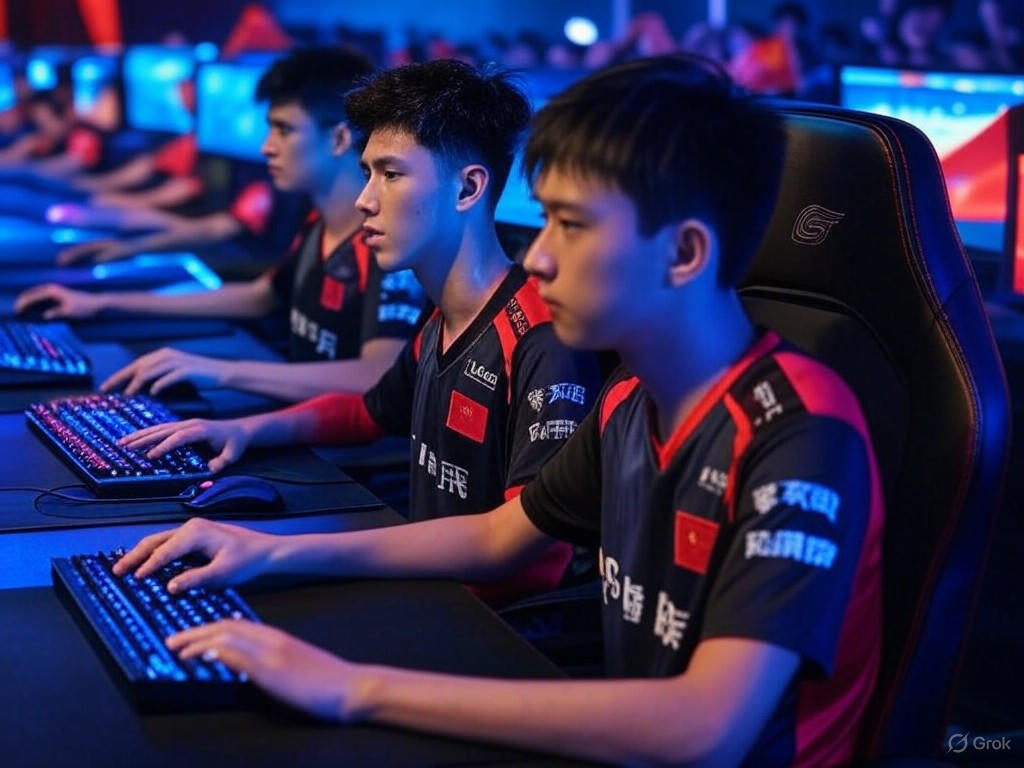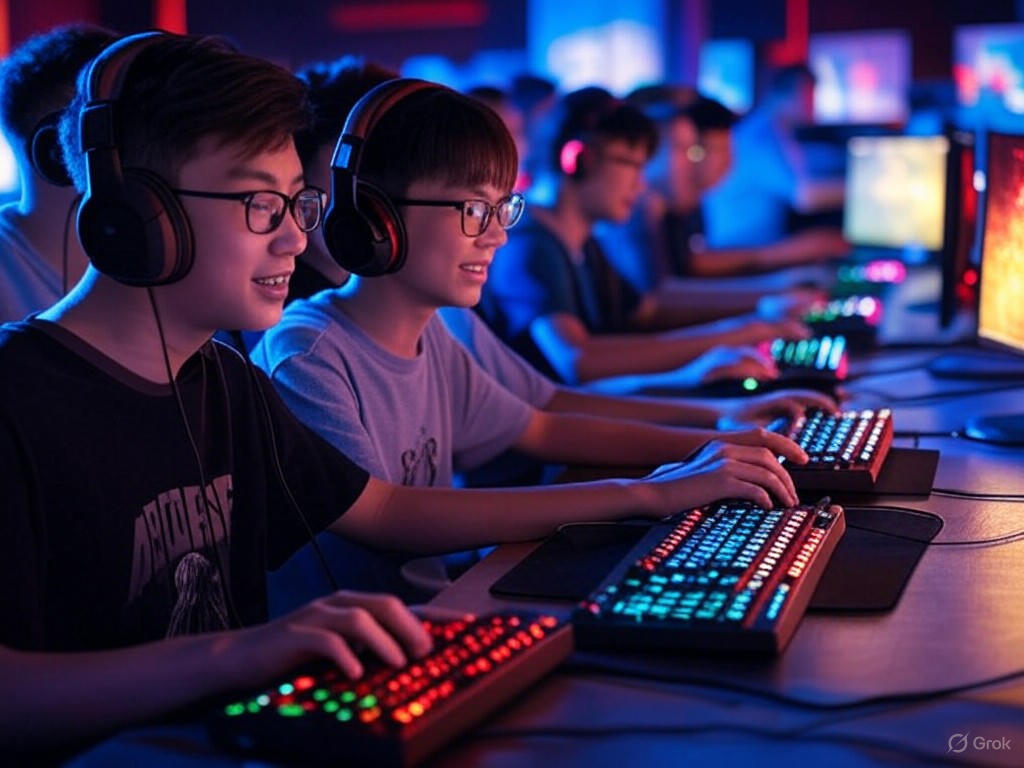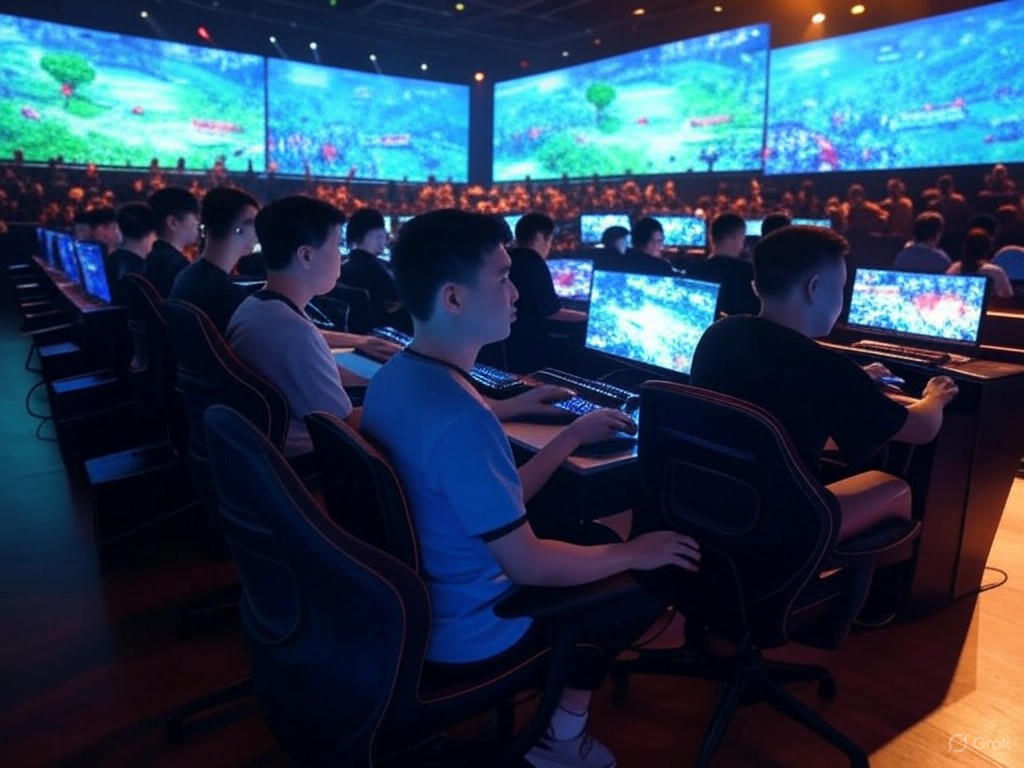E-Sports in China: A Billion-Dollar Industry
In the spirit of old riverboat tales from the Mississippi, where a good yarn could turn a simple card game into a legend, I find myself pondering the modern marvel of e-sports. Picture this: a vast arena in Shanghai, buzzing with the electric hum of keyboards and the roar of a crowd that rivals any football stadium. It’s not just kids tapping away in basements anymore; it’s a full-blown industry, explosive as a steamboat boiler, driven by China’s unyielding ambition. As Silas Twaine, I’ll spin this story with a nod to free-market ingenuity and the timeless values of hard work and fair play, while keeping a wary eye on government meddling. Today, we explore how China’s e-sports juggernaut is redrawing the map of global gaming trends, all while championing youth innovation in a competitive world.
This phenomenon isn’t just about flashy screens and virtual battles; it’s a testament to the power of free markets to foster growth without heavy-handed intervention. China’s e-sports industry has skyrocketed, influencing everything from game design to youth culture worldwide. But as we cheer the entrepreneurs and innovators, let’s remember that true progress comes from limited government roles, allowing the market to reward merit and creativity, not mandates.
The Explosive Growth in China: A Tale of Innovation and Youth Energy
Ah, China’s e-sports scene—now there’s a story worth telling around the campfire. Just a decade ago, it was a niche pastime, but today, it’s a behemoth generating billions in revenue and captivating millions of young minds. The industry has grown at a blistering pace, with estimates suggesting it could reach $60 billion by 2025, fueled by a burgeoning middle class and a tech-savvy youth population eager for new frontiers. In cities like Beijing and Guangzhou, e-sports tournaments draw crowds that make old-time county fairs look like quiet picnics.
What’s driving this? Simple: the free market at its finest. Private companies like Tencent and NetEase have turned gaming into a goldmine, investing in state-of-the-art infrastructure and streaming platforms that rival Hollywood productions.  A team of dedicated Chinese e-sports athletes strategizing during a high-stakes tournament, showcasing the intense focus and teamwork that define this competitive world.
A team of dedicated Chinese e-sports athletes strategizing during a high-stakes tournament, showcasing the intense focus and teamwork that define this competitive world.
This growth isn’t just about entertainment; it’s reshaping how youth engage with technology and each other. In a nation of over 1.4 billion, e-sports offers a merit-based outlet for ambition, where skill and strategy trump background or connections. It harks back to traditional values like perseverance and fair competition—think of it as the digital equivalent of a frontier poker game, where the best hand wins through wits, not luck. Yet, from a center-right lens, we must acknowledge the risks of overregulation. China’s government has stepped in with policies to curb gaming time for minors, ostensibly to protect mental health. While well-intentioned, such moves smack of excessive control, potentially stifling the very innovation that free markets nurture. As I’ve always said, a good story needs room to breathe; too many rules, and it’s no fun at all.
Global Implications: How China’s Boom Influences the Gaming World
Now, let’s broaden the lens. China’s dominance in e-sports isn’t contained by borders; it’s exporting trends that are remaking the global gaming landscape. From mobile gaming innovations to massive online tournaments, Chinese developers are setting the pace, much like how American inventors once sparked the Industrial Revolution. The industry is now a key export, with Chinese games like "Honor of Kings" topping charts worldwide, blending cultural elements with universal appeal.
This influence extends to economic ripple effects. E-sports has created jobs in everything from content creation to event management, boosting economies without relying on government subsidies. In the U.S. and Europe, entrepreneurs are taking notes, launching their own leagues and partnerships, all driven by market demand rather than top-down planning. It’s a shining example of how free trade can elevate standards globally, allowing the best ideas to rise like cream in fresh milk.
But let’s not gloss over the challenges. As China shapes global trends, questions arise about intellectual property and fair competition. Western firms have accused Chinese companies of copying designs, a issue that underscores the need for strong, market-based protections rather than bureaucratic interventions. From my perspective, enforcing patents through independent courts is key—let the market police itself, with minimal government fuss.  Young gamers gathered in a bustling Shanghai cafe, illustrating the community spirit and entrepreneurial vibe of China’s e-sports culture.
Young gamers gathered in a bustling Shanghai cafe, illustrating the community spirit and entrepreneurial vibe of China’s e-sports culture.
Evidence from reliable sources paints a clear picture. According to a Wall Street Journal analysis, China accounted for over 40% of global e-sports revenue in 2023, driven by youth participation rates that dwarf those in the West. Meanwhile, IEEE Spectrum highlights how Chinese tech advancements, like AI-driven training tools, are enhancing player performance and attracting international investment. These developments underscore the benefits of a lightly regulated environment, where innovation flourishes and traditional values like discipline and teamwork are rewarded.
Challenges and Opportunities: A Balanced View from the Center-Right
Of course, no story is without its twists. The rapid expansion of e-sports raises concerns about youth well-being, from screen addiction to the physical toll of long hours. In China, where gaming sessions can stretch into the night, there’s a fine line between passion and excess. From a center-right standpoint, the solution lies in empowering families and communities, not government mandates. Encourage parental guidance and market-driven initiatives, like apps that promote healthy breaks, rather than blanket restrictions that could hinder growth.
Economically, e-sports offers a boon for free markets. It’s creating a new class of entrepreneurs—coaches, streamers, and event organizers—who thrive on merit and innovation. Yet, we must guard against protectionism. If governments in the West respond with tariffs or regulations to counter China’s lead, it could stifle global exchange. Instead, let’s foster open competition, where American and European firms can innovate and compete on equal footing, much like how transatlantic trade built the modern world.
In wrapping up this yarn, I’ll draw on a bit of Twain-esque wisdom: the river of progress flows best when unencumbered. China’s e-sports industry is a river in flood, shaping global gaming trends and inspiring [youth] to chase their dreams. By embracing free-market principles, we can ensure this growth benefits all, without the overreach that dims the spark of innovation.
Conclusion: Steering Toward a Promising Horizon
As the sun sets on this digital frontier, let’s raise a glass to the pluck and ingenuity of China’s e-sports pioneers. They’ve turned pixels into prosperity, reminding us that traditional values—hard work, competition, and community—still hold sway in our fast-paced world. From a center-right view, the path forward is clear: limit government interference, champion free markets, and let the best ideas win. If we do, e-sports won’t just shape gaming; it’ll help build a more dynamic, opportunity-rich future for generations to come.

